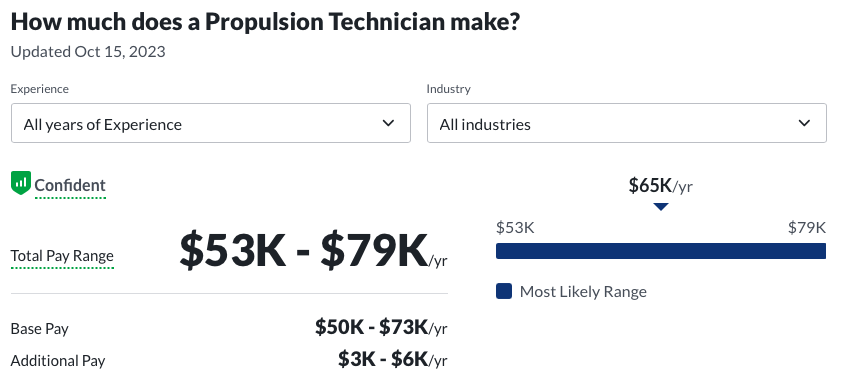A propulsion technician plays a key role in maintaining and repairing propulsion systems in various industries such as aerospace and defense. This article provides valuable information about the responsibilities, skills, and qualifications required to become a propulsion technician.
There are several job options in the aerospace business that you can concentrate on if you want to work in this field. The design and construction of propulsion components for aircraft, spacecraft, and other aerospace devices are basically done by propulsion technicians and engineers.
However, you can determine whether you want to pursue a career in propulsion engineering by learning more about the duties of a propulsion technician and how to become one. In this post, we’ll be talking about propulsion technicians, their duties, how to become one, how much they’re been paid, their skill set, and employment prospects.
Having stated that, let’s get started straight away.

What does a propulsion technician do?
The testing or development of propulsion systems, including internal combustion engines, hybrid and electric propulsion technologies, and sophisticated control systems, falls within the purview and duties of the Propulsion Technician. Therefore, the propulsion technician is in charge of facilitating the execution of development plans that meet the needs of the facility and internal customers for quality, cost, and time while abiding by safe work practices and risk management. This will enable consistency and accuracy in build/test, measurement, methodology, and technology.
The propulsion technician develops, enhances, or creates new propulsion technologies by performing a variety of specialized activities in a controlled setting. Propulsion technicians are vital liaisons between engineers and the propulsion development function. They take the lead in development builds and test deliveries, handling creation, editing, first-line data processing, and quality validation.
Propulsion Technician Duties
However, to provide consistent build, development, and quality assurance of the propulsion system, the Propulsion Technicians will support and interact with a wide range of internal and external stakeholders, including engineers, suppliers, and external agencies and organizations. The Propulsion Technicians are the source of technical leadership within their particular functional area which practically means the Propulsion Technicians:
- Encourage the creation of ideas to create new or alternative technologies.
- Consider a project’s goal from its inception, as presented by an engineer, to its design and delivery in a consistent, methodical manner, guaranteeing the acquisition of precise and high-quality technical data.
- Examine the equipment needs that will enable the development of affordable products.
- Examine component and/or product quality issues to make sure solutions are appropriate for the situation and comply with applicable laws and regulations.
- Act proactively to encourage ongoing development
- Collaborate with interdisciplinary groups to facilitate the advancement of new or substitute technologies, encompassing production and integration procedures.
- Give engineers first-line defect diagnosis reports.
- Create standard operating procedures for the delivery and setup of builds or tests.
How much does a propulsion technician make?

According to Glassdoor, Propulsion technicians can expect to make an average of about $53K-79K annually nationwide. Depending on the kinds of components the propulsion technicians create, their level of industry expertise, the company they work for, and where they are employed, this number may change.
Wondering about exempt vs. non-exempt employment positions? Check out: Exempt vs Nonexempt Employment: Understanding Classifications
How to become a propulsion technician
To learn how to become a propulsion technician, make sure to go over these steps:
1. Learn Propulsion Education for Engineers
You should think about how much education you’ll need if you want to work as a propulsion technician. A bachelor’s degree is held by 72.0% of propulsion technicians and engineers, according to actual resumes. Thirteen percent of propulsion technicians hold master’s degrees, indicating a higher level of education.
However, even though most propulsion technicians hold a college degree, one can still work in the field with just a high school diploma or GED. Meanwhile, one of the most crucial steps in becoming a propulsion technician is choosing the right major. As a result, the most popular majors are mechanical engineering, aerospace engineering, and engineering, according to data from resumes of propulsion technicians.
2. Learn and Develop Skills Designated for Propulsion Engineering
Before you can apply for jobs as a propulsion technician, you need to have certain essential abilities. The following prerequisites are commonly listed in job descriptions for propulsion technicians and engineering.
3. Undergo Complete Relevant Training and Internships for Propulsion Engineering
Propulsion technicians typically undergo on-the-job training for six to twelve months after being hired. During this period, new propulsion technicians acquire the knowledge and abilities needed for their position and their employer.
4. Tasks and Accountabilities of Research Propulsion Engineers
What propulsion engineers do on a regular day is comprised of their jobs and responsibilities. The primary responsibilities and obligations listed on job listings for propulsion engineers are as follows:
- Utilizing the project base matrix permission technique, and controlling Jenkins security by granting authorized developers and testers restricted access.
- Do FEA on the design elements.
- Calculate equations to feed into MATLAB so it can produce results.
- Take charge of RF design and testing for the structural integration of the AESA prototype.
- Assist the duty cycle group of customers in calculating suspension loads.
- Obtain FAA aircraft engine flying certification, conduct flight tests, and prepare paperwork and documentation.
5. Apply for Jobs as a Propulsion Technician
It’s now time to look for work as a propulsion technician. Think about the following advice for a positive result when job hunting:
- Look for appropriate postings on job boards.
- Speak with your contacts in the industry.
- Make direct contact with organizations that you are interested in working for.
- Be wary of employment fraud.
Propulsion technicians are important because they bridge between what engineers design and the actual physical product.
As a result, they need to have a wide range of skillsets and technical competency.
What a Propulsion Technician Must Know
A propulsion technician needs to be aware of:
- The fundamentals of engineering, including physics, math, mechanics, and electrical and electronic applications that are pertinent to their area of expertise
- The significance of creating and upholding Standard Operating Procedures (SOPs) to ensure compliance with all applicable laws and codes of conduct.
- How to set priorities for their workload and that of their team to meet goals and make efficient use of resources and equipment
- The formats of the several data collection systems that were employed.
- The guiding concepts and use of measurement systems analysis techniques.
- The laws, organization rules, and procedures about health and safety that must be followed in a propulsion setting
- The methods, protocols, and records utilized in each specific domain of accountability for risk assessment.
- How to ask questions, listen intently, ask for help when needed, support and guide others.
- How to apply internal and external quality standards and protocols that are relevant to propulsion system design, development, and manufacturing.
- How to accurately analyze and understand first-line data so that you can evaluate quality, make inferences, offer advice, and interact with people in a standard manner.
- The significance of managing and overseeing supplier performance for organizations to guarantee the cost, service, quality, and sustainability goals to be met, as well as their obligations in the process
Closing Thoughts on Propulsion Technicians
Propulsion Technicians are responsible for key infrastructure in aerospace and defense industries.
They bring the design work that propulsion engineers do to real life.
Are you trying to become a propulsion technician?
Make sure to have your resume written or that you’re ready to interview for propulsion technician positions.
About the author

Kazuyoshi Fujimoto, PE
Founder | Engineering Career Coach | Principal Mechanical Engineer
Kazu oversees all of ultmeche’s engineering services. He provides consulting such as resume reviews, rewrites, mock interviews, and all services career related. Additionally, Kazu performs consulting work regarding Oil & Gas, Automotive, and Aerospace & Defense. Kazu is licensed as a professional engineer in the state of California and has 9+ years of experience in Oil & Gas, Automotive, and Aerospace & Defense.

1 thought on “What You Need to Know About Propulsion Technician”